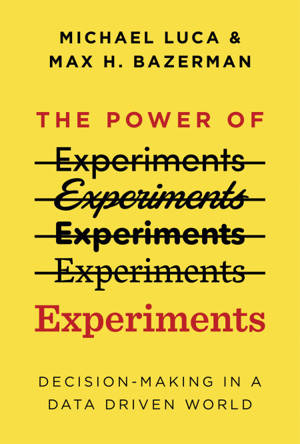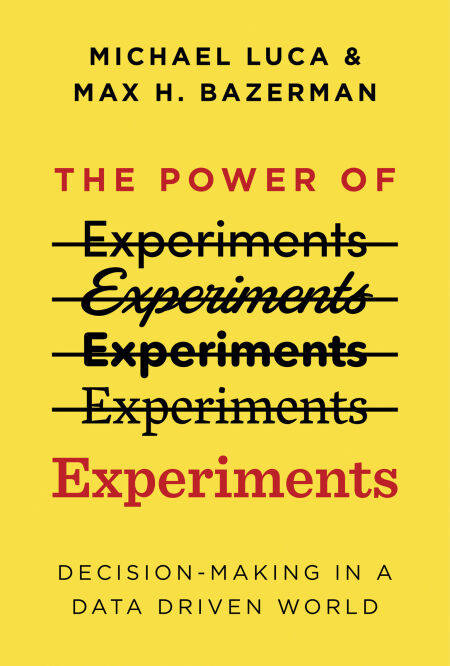
- Afhalen na 1 uur in een winkel met voorraad
- Gratis thuislevering in België vanaf € 30
- Ruim aanbod met 7 miljoen producten
- Afhalen na 1 uur in een winkel met voorraad
- Gratis thuislevering in België vanaf € 30
- Ruim aanbod met 7 miljoen producten
Zoeken
The Power of Experiments E-BOOK
Decision Making in a Data-Driven World
Michael Luca, Max H. Bazerman
E-book | Engels
€ 19,66
+ 19 punten
Uitvoering
Omschrijving
How tech companies like Google, Airbnb, StubHub, and Facebook learn from experiments in our data-driven world—an excellent primer on experimental and behavioral economics
Have you logged into Facebook recently? Searched for something on Google? Chosen a movie on Netflix? If so, you've probably been an unwitting participant in a variety of experiments—also known as randomized controlled trials—designed to test the impact of different online experiences. Once an esoteric tool for academic research, the randomized controlled trial has gone mainstream. No tech company worth its salt (or its share price) would dare make major changes to its platform without first running experiments to understand how they would influence user behavior. In this book, Michael Luca and Max Bazerman explain the importance of experiments for decision making in a data-driven world.
Luca and Bazerman describe the central role experiments play in the tech sector, drawing lessons and best practices from the experiences of such companies as StubHub, Alibaba, and Uber. Successful experiments can save companies money—eBay, for example, discovered how to cut $50 million from its yearly advertising budget—or bring to light something previously ignored, as when Airbnb was forced to confront rampant discrimination by its hosts. Moving beyond tech, Luca and Bazerman consider experimenting for the social good—different ways that governments are using experiments to influence or “nudge” behavior ranging from voter apathy to school absenteeism. Experiments, they argue, are part of any leader's toolkit. With this book, readers can become part of “the experimental revolution.”
Have you logged into Facebook recently? Searched for something on Google? Chosen a movie on Netflix? If so, you've probably been an unwitting participant in a variety of experiments—also known as randomized controlled trials—designed to test the impact of different online experiences. Once an esoteric tool for academic research, the randomized controlled trial has gone mainstream. No tech company worth its salt (or its share price) would dare make major changes to its platform without first running experiments to understand how they would influence user behavior. In this book, Michael Luca and Max Bazerman explain the importance of experiments for decision making in a data-driven world.
Luca and Bazerman describe the central role experiments play in the tech sector, drawing lessons and best practices from the experiences of such companies as StubHub, Alibaba, and Uber. Successful experiments can save companies money—eBay, for example, discovered how to cut $50 million from its yearly advertising budget—or bring to light something previously ignored, as when Airbnb was forced to confront rampant discrimination by its hosts. Moving beyond tech, Luca and Bazerman consider experimenting for the social good—different ways that governments are using experiments to influence or “nudge” behavior ranging from voter apathy to school absenteeism. Experiments, they argue, are part of any leader's toolkit. With this book, readers can become part of “the experimental revolution.”
Specificaties
Betrokkenen
- Auteur(s):
- Uitgeverij:
Inhoud
- Aantal bladzijden:
- 232
- Taal:
- Engels
Eigenschappen
- Productcode (EAN):
- 9780262358262
- Verschijningsdatum:
- 17/02/2020
- Uitvoering:
- E-book
- Beveiligd met:
- Adobe DRM
- Formaat:
- ePub

Alleen bij Standaard Boekhandel
+ 19 punten op je klantenkaart van Standaard Boekhandel
Beoordelingen
We publiceren alleen reviews die voldoen aan de voorwaarden voor reviews. Bekijk onze voorwaarden voor reviews.







